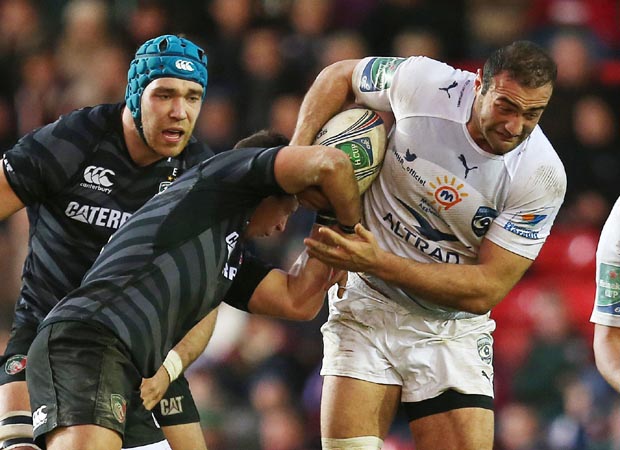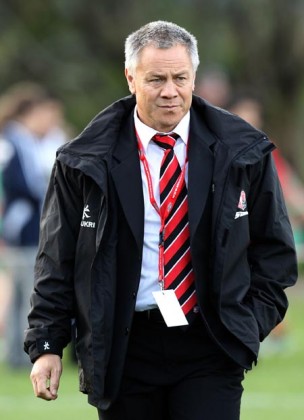 While the rest of the rugby world would be delighted to avoid playing New Zealand in the World Cup, Georgia will be going flat out over the next fortnight to ensure they get the chance of meeting the reigning champions at the Millennium Stadium on October 2 next year.
While the rest of the rugby world would be delighted to avoid playing New Zealand in the World Cup, Georgia will be going flat out over the next fortnight to ensure they get the chance of meeting the reigning champions at the Millennium Stadium on October 2 next year.
The Georgians have been hitting top form recently under New Zealand coach Milton Haig but, although now assured of a place at RWC 2015, need to close out the European Nations tournament with wins against Spain and Romania to book their day of destiny in Cardiff.
That last game, against Romania at the Dinamo Stadium in Tblisi on March 15, seems set to attract another 50,000-plus crowd, not to be sniffed at anywhere in the rugby-playing world.
“We are desperate to make sure we get that match against New Zealand,” says Haig, the former head coach at Counties Manakau. “We had three main aims when we started our programme two years ago after the 2011 World Cup.
“Firstly we wanted to qualify for RWC2015. Job done. Secondly we wanted to finish top of the European Nations and set up a game against the All Blacks that would be the highlight of all of our careers, myself included. And finally we want to make an impact in the tournament. So the hard work hasn’t even begun yet.”
Georgian rugby would certainly be at a tipping point. With its large and increasing number of professionals in France’s Top14 and a fledgling domestic league now in place it is poised to take the next step and, although the way forward often seems deliberately blocked by the international community, few could argue with a strong World Cup showing.
If Georgia make it through to Pool C they would also face Argentina, Tonga and Africa 1 as well as the All Blacks and there is no reason why they should not be competitive in three of those four games.
Haig insists: “When I look at our squad we can improve another 25 per cent on where we already are. Not so much in fitness, there is a really good culture for physical fitness in Georgia and the guys understand what it takes, but there is still a huge potential to step up in the next 18 months with our skillsets and game management, performing under pressure.

“As a coach that’s a fantastic prospect, so much to work on and a deal of outstanding raw talent.
“The Georgians are a very passionate, determined people which is part of what makes them good rugby players but on the field we have to rein in a little. If you YouTube punch-ups and flare-ups you will see quite a few featuring Georgian players and we need to work on that!
“It’s hard enough playing against the bigger teams anyway, playing against them when you have had players yellow-carded makes it impossible. I might try and bring in a sports psychologist on that one.”
While encouraging to hear such positive words from Haig, it is still sobering to reflect on how little the international rugby community has done to help a nation that, along with the Pacific Islanders, probably has more potential to grow than other “minnow”.
Take this horrible little statistic for example. How many games outside of the World Cup finals have the ambitious Georgians been granted against Tier One opposition since the IRB World rankings started ten years ago?
The answer is just one, against the Pumas last summer in San Juan when they gave a very decent account of themselves. One miserable match in 89 Tests at a time when Georgia is ripe for development and hungry to take on new challenges. Indeed during that period they have only ever played three teams above them in the IRB world rankings – Canada, Samoa and Fiji, garnering two wins along the way. Given that virtually the only way to climb up the IRB world rankings is to beat teams above you in those rankings Georgia are constantly fighting a Catch 22 situation.
“We would be very confident of giving all the Six Nations teams a good game in Tblisi but there is just no opportunity to play that standard of opposition and it’s a sporting fact of life that you are only ever going to improve significantly by playing better teams.
“Mark Egan, IRB head of development, is aware of this but it is not easy, fixture schedules are made three years in advance. The Tblisi Cup worked well for us last June – we hosted Uruguay, Emerging Ireland and a South Africa Presidents XV – and somethingly similar is in place for this year but ultimately we need regular games against ranking teams.”
So Georgian rugby battles on in hope a much as expectation. Against Russia last week they sold all 54,087 tickets at the Dinamo Stadium although dire weather meant “only” 48,000 attended. Georgia is a poor country so their federation keeps tickets down to around £1.60 to ensure the biggest possible crowds but the result is that those near sell-outs do not drive the game financially.
There are three national Leagues with division one, topped by Lelo Tblisi, basically a professional league with players earning about £200 per month, a pittance by western European standards but comparable with a modest working wage in Georgia.
A young player has the option of at least trying for a couple of years. They see Mamuka Gorgodze, twice Georgian sportsman of the year, earning the big bucks with Montpellier and heading for Toulon in June and they dream of something similar.
You can sense a growing frustration, though, especially at the hopelessness of ever being allowed to aspire to Six Nations rugby. “We understand the commercial argument against promotion and relegation from the Six Nations,” says operations manager Lasha Khurtsidze.
“But that’s a private commercial arrangement that works for only six nations. Rugby is an international sport for everybody where there should be free competition.
“It goes against everything good and natural in sport not to be allowed to challenge for the next level, not to be as good as you can be.
“If Georgia has a bad European Nations tournament we are relegated but if we do well and win the European Nations we are suppressed. The six are protected against failure and no sportsman looking at this system can say it is logical or fair.”























